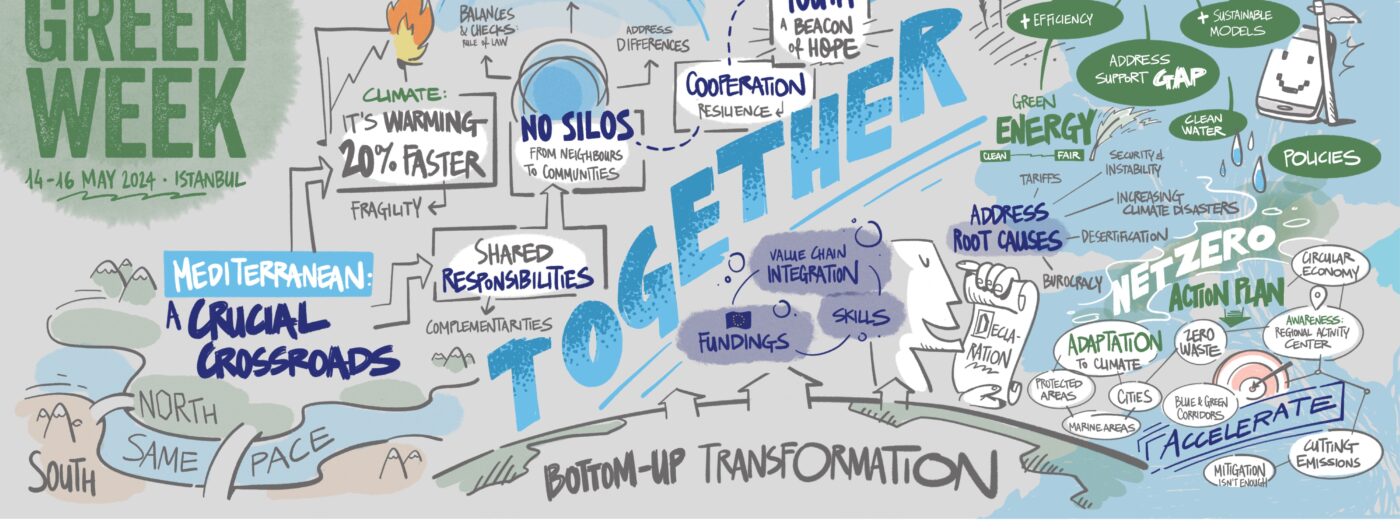
First-ever Mediterranean Green Week gathered 150 on quest for sustainable future
- As a region warming at a rate 20% faster than the global average, the Mediterranean is particularly vulnerable to issues relating to environmental degradation, extreme weather phenomena, and energy crises.
- The Mediterranean Green Week, which took place in Istanbul from May 14 to 16, provided 150 people with a platform to explore how to best address pressing sustainability-related challenges in an effective and holistic manner.
14-16 May 2024, Istanbul. The first-ever edition of Mediterranean Green Week: Towards a Greener and More Resilient Mediterranean, co-organised by the Union for the Mediterranean (UfM) and the OECD, kicked off in Türkiye. Attracting some 150 public officials, private sector representatives, civil society members and scientists, participants convened over three days to exchange views on how to collaboratively tackle the region’s interlinked climate, energy, and environmental crises.
Kick-starting with an opening session with remarks from speakers including UfM Secretary General Nasser Kamel, OECD Istanbul Centre Head Achraf Bouali, United Nations Environment Programme/ Mediterranean Action Plan Coordinator Tatjana Hema, and Deputy Head of the EU Delegation to Türkiye Jurgis Vilcinskas, and a high-level plenary who saw the attendance Walid Fayyad, Minister of Energy and Water of Lebanon and Maša Kociper, State Secretary of the Office of the Prime Minister of Slovenia, attendees broke out into 20 parallel multi-thematic meeting groups. These touched upon subjects ranging from the Water-Energy-Food-Ecosystems Nexus to the latest developments in hydrogen and other aspects of the renewable energy transition or green funding mechanisms such as the Blue Mediterranean Partnership, a UfM-backed initiative that aims to mobilise at least €1 billion in sustainable blue economy investments in the Southern and Eastern Mediterranean.
“The Euro-Mediterranean region is at a crossroads, with ever-present environmental challenges evidencing the need for a more determined and resolute green transition. It is imperative we cultivate sustainability-conscious communities if we wish to face the challenges that lay before us with resilience,” said UfM Secretary General Nasser Kamel. “The Union for the Mediterranean will continue to do everything in its power to promote collaborative efforts and forge new partnerships to this end.”
Key highlights of the Mediterranean Green Week included the establishment of the UfM working group on Gas, Emissions Abatement and Hydrogen. Approved by all UfM Member States by consensus, the working group will bring together policymakers, industry representatives, regulators, energy stakeholders, traders and shippers, representatives from financing institutions – all from across the Euro-Mediterranean region to develop shared viewpoints and proposals on natural gas, renewable and low-carbon gases as well as clean technologies and emissions abatement issues in order to reinforce the security and sustainability of supply and the regional exchanges. It will be run by Organisation Méditerranéenne de l’Energie et du Climat (OMEC) in coordination with the UfM secretariat and the UfM Co-presidency.
The conference also saw the launch of the Med Alliance of Think Tank on Climate Change (MATTCC), an initiative of a group of like-minded think tanks active in the broader Mediterranean region, coordinated by the IMAL Initiative for Climate and Development, a Morocco-based think-do tank; ECCO, an Italy-based climate think tank; and Sefia, a research-oriented environmental NGO from Türkiye.
“As we gather here today, we are reminded of our shared responsibility to address the environmental, energy, and climate challenges the region is facing. It’s a moment for all of us to renew our commitment to promoting sustainable development and cooperation across borders. Let us seize this opportunity to advance dialogue, formulate strategies, and forge partnerships that will drive meaningful change for a resilient Mediterranean,” said OECD Istanbul Centre Head Achraf Bouali.
Under the overall coordination of UfM Deputy Secretary General for Water, Environment and Blue Economy, Almotaz Abadi, and UfM Deputy Secretary General for Energy and Climate Action, Grammenos Mastrojeni, the Mediterranean Green Week aimed to promote a whole-of-society approach to the Mediterranean region’s threats to sustainability by engaging local authorities and supporting the engagement of young people and women to encourage policy-making that aligns with needs on the ground. With the presentation of reports such as the Green Circular Economy at the Mediterranean Level Including Green Skills and Jobs, it also served to inform decision-making processes with science-based evidence while helping stakeholders build partnerships and raise awareness of the need for urgent action among citizens.
More information


